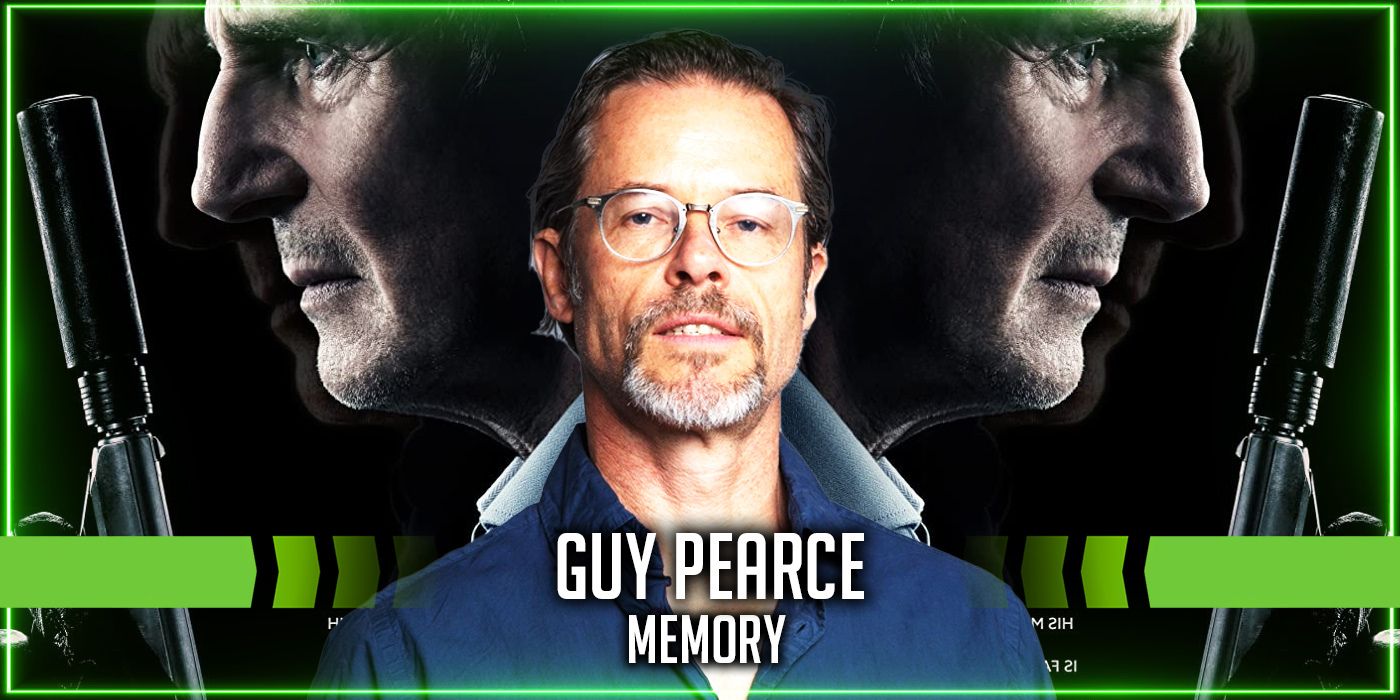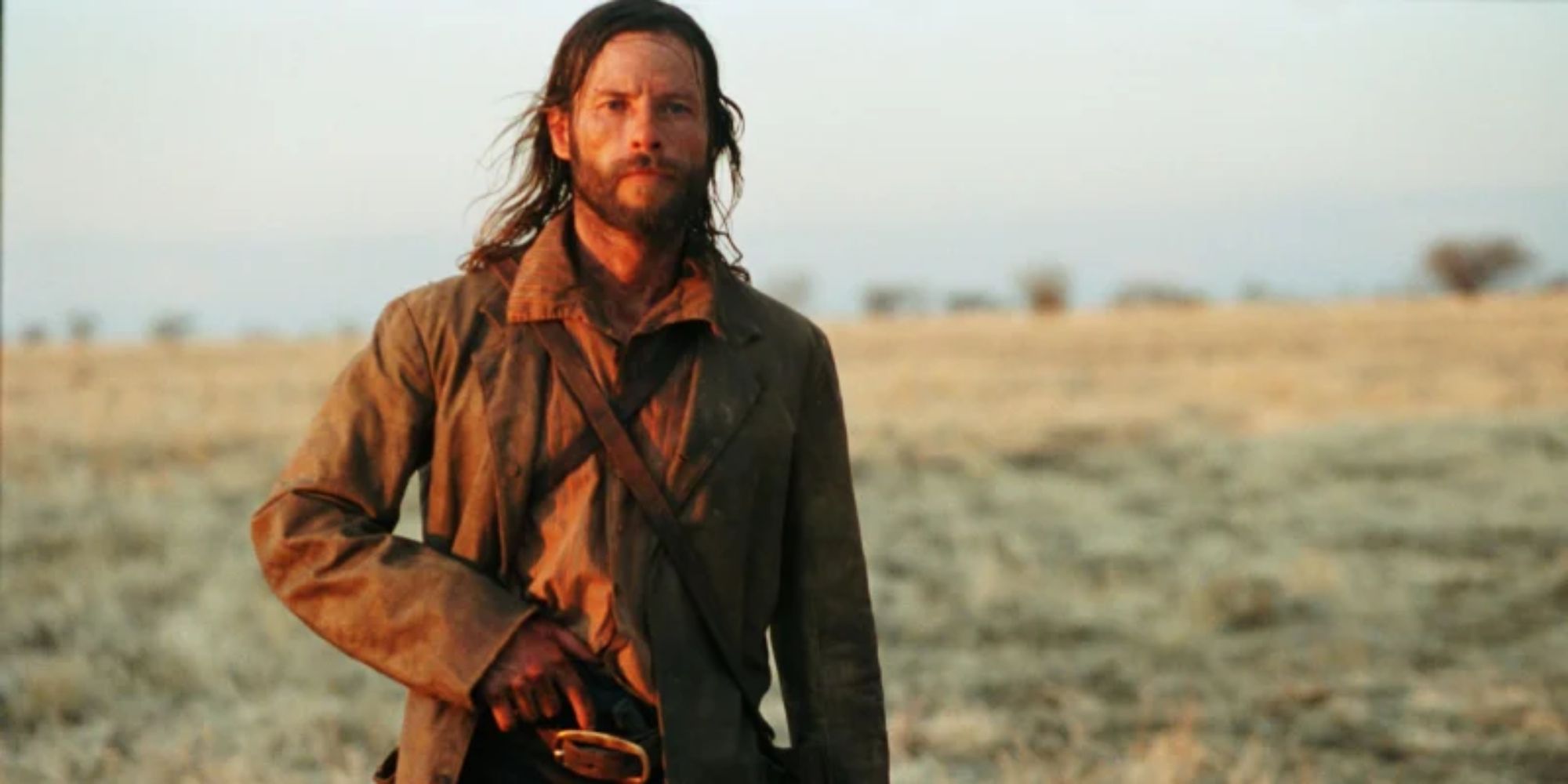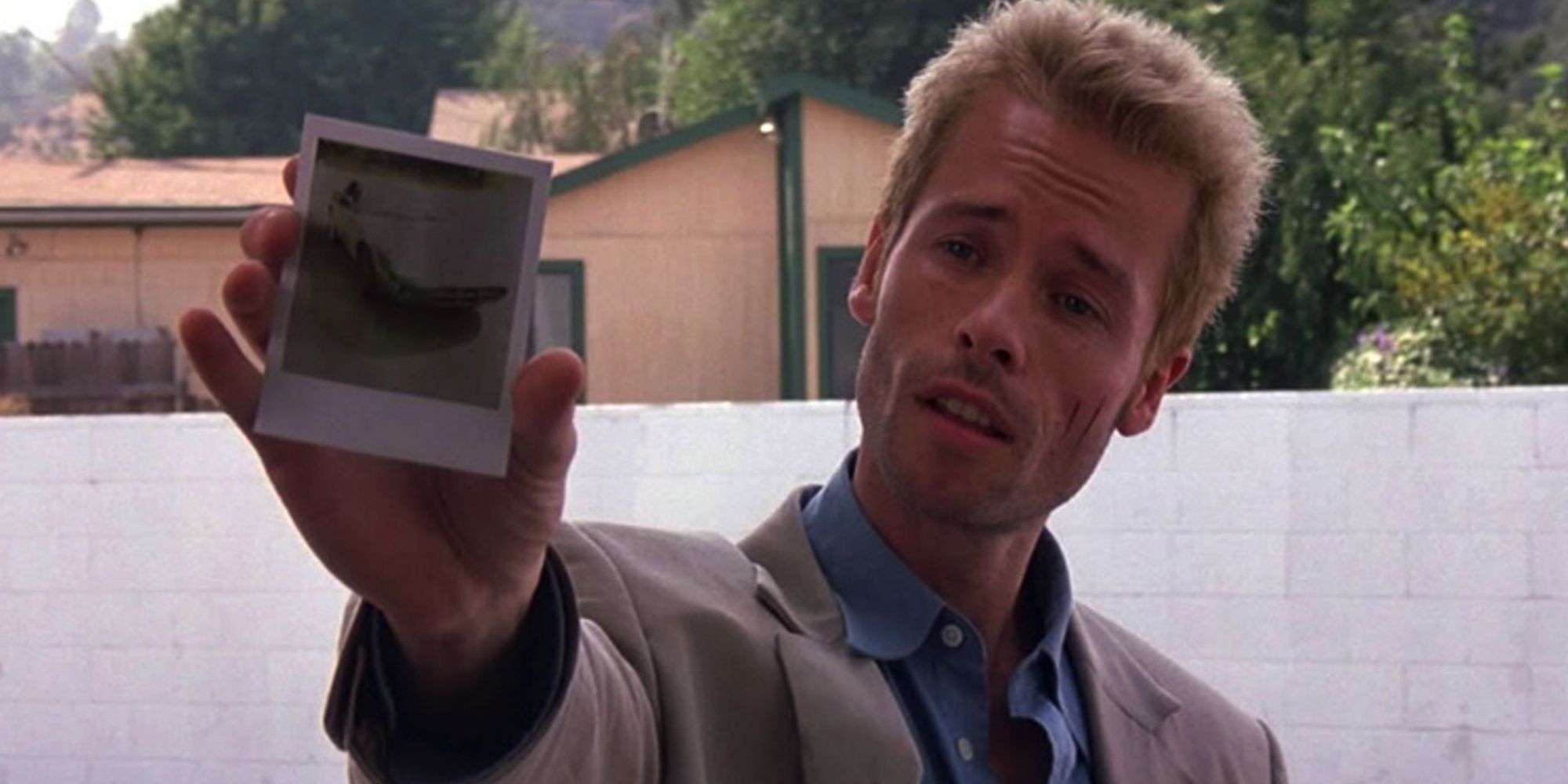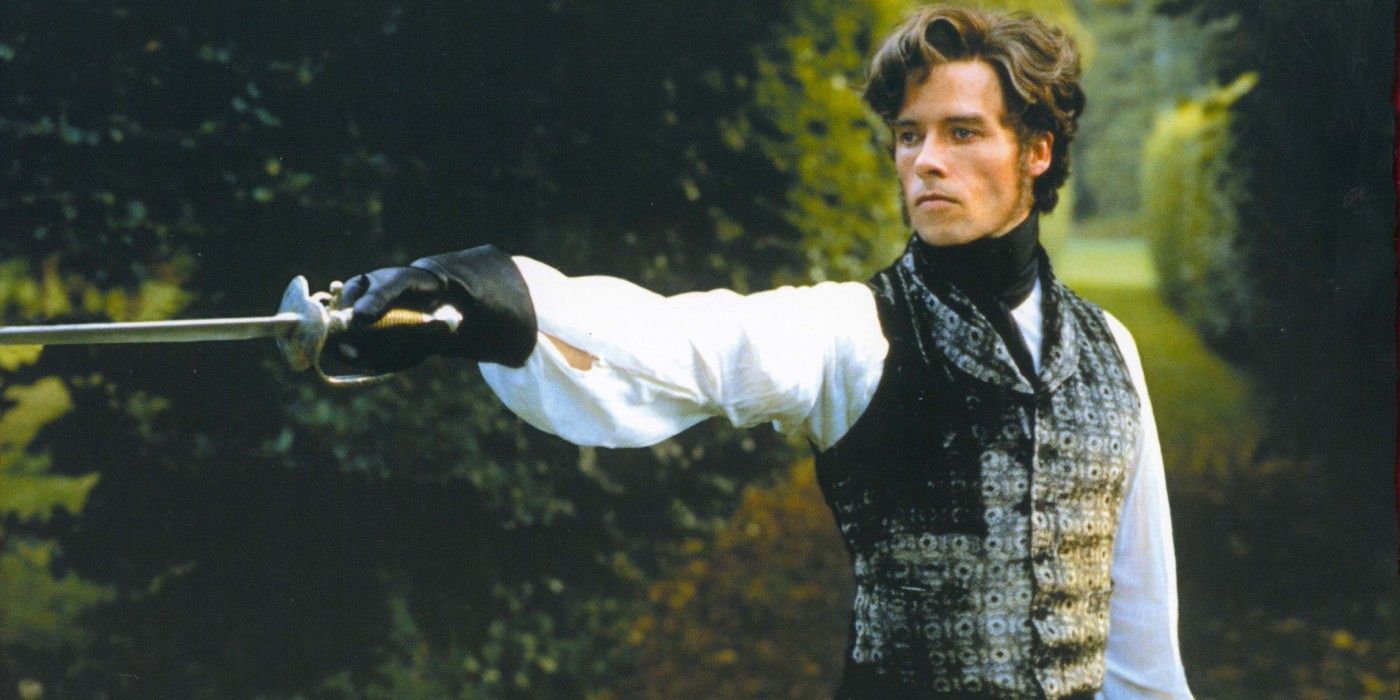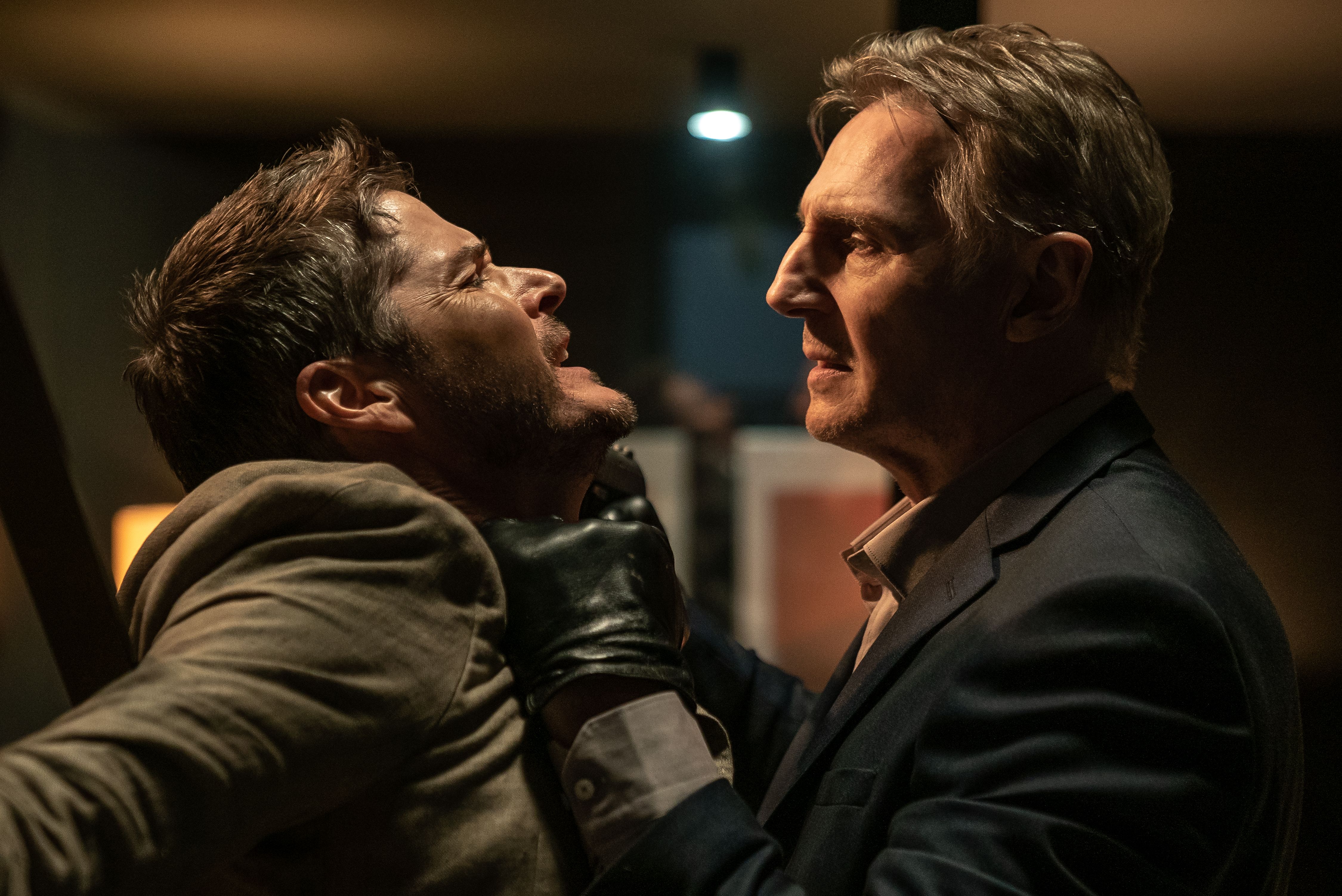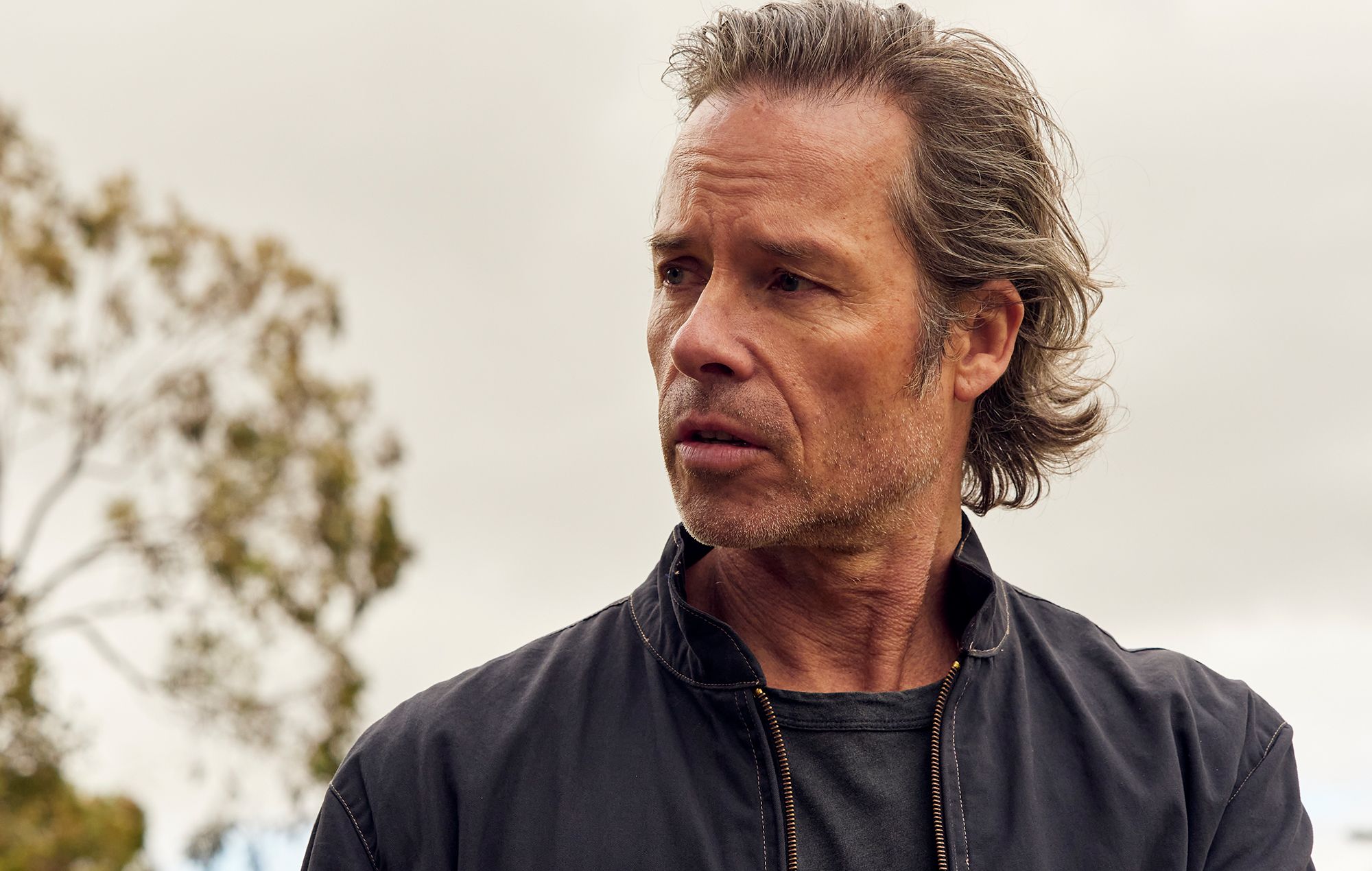With director Martin Campbell’s Memory now playing in theaters, I recently conducted a wide-ranging interview with Guy Pearce, who plays an honest cop. In the film, Liam Neeson plays an expert assassin that’s dealing with getting older and suffering from a memory that is beginning to falter. When a job goes wrong because he refuses to kill a child, Neeson must figure out who hired him while staying ahead of the FBI and his failing memory. Memory also stars Monica Bellucci, Taj Atwal, Ray Fearon, and Harold Torres. The film is produced by Cathay Schulman, Moshe Diamant, Rupert Maconick, Michael Heimler, and Arthur Sarkissian.
During the interview, Pearce talked abut why he loved working with Neeson, making the film, his process on set, how he prepares for a role, what someone should watch if you’ve never seen his work, Memento, The Proposition, which of his roles required the most preparation, and what he remembers about making The Count of Monte Cristo. In addition, he talked about some of his future projects like A Spy Among Friends with Damian Lewis, director Andrew Hunt’s This Infernal Machine.
Watch what Guy Pearce had to say in the player above, or you can read the conversation below.
COLLIDER: If someone has actually never seen anything that you've done before, what is the first thing you want them watching and why?
GUY PEARCE: Well, I always talk about The Proposition as being my favorite film of the films that I've done. I probably still feel that way. I've certainly been part of some great stories. Absolutely, no question about it. Obviously, things like L.A. Confidential and Priscilla and Memento are ones for people to take a look at. But I think there's something about The Proposition that feels more personal. I don't know if it's because it's Australian, as well. It's just a really evocative film. There's something about filmmaking and that film, that works really well together. No question about the filmmaking abilities of Curtis Hanson in L.A. Confidential and certainly Chris Nolan in Memento. But as I say, there's just something really visceral and effective about The Proposition.
If I'm not mistaken, didn't Nick Cave write that or am I wrong?
PEARCE: Nick Cave did write that, and he also did the music for it.
I was going to say that maybe there's something about Nick's involvement also that makes it special.
PEARCE: His involvement absolutely makes it special, but it's the culmination of everything. It's John Hillcoat's directing, and it feels like you are inside a Nick Cave song. So yes, you're absolutely right, him having penned that story, I think, makes it unique.
You touched on Memento. I've heard about people that have done edits of Memento, so they watch it in order. Have you heard about this?
PEARCE: I haven't heard about people doing edits with the film itself, but I know that there are versions of the script out there that are ... Well, in fact, maybe I did know that there was a version where you can watch it, as an extra on a DVD thing, where you can watch it in order. I think I might have known that actually, sorry. I just lied.
I've never watched it in order. I just think that it's fascinating. Of the films that you've made, which one do you think changed the most in the editing room versus what you were expecting?
PEARCE: Well, I did a film called Till Human Voices Wake Us, which was a series of present and past elements. Me as a young boy with a young girl and then me as an older man and that young girl had died in the story. And so me as an older man with the ghost of that woman with me, who Helen Bonham Carter played. I'm actually trying to remember now, but I think in the script, it really flashed back and forth, back and forth, back and forth, I think. But in the finished film, it was completely the kid's story, and then it was our story and there was just something about it that just didn't work as it should have.
It's funny talking about Memento on the opposite end of the spectrum, I've never done a film that has ended up as exactly like the script, as that film. Every film has some version of reordering things usually, or a couple of scenes taken out or expanded on this scene and gotten rid of that one, et cetera. Even to the point sometimes where they'll change the order of scenes, and you go, but I was wearing a blue shirt now I'm wearing a red shirt, and now I'm wearing the blue shirt again, because you've taken that scene from then, and you've plunked in there. So, that stuff happens. Memento is exactly like the script was.
Yeah, this Nolan guy, he's going to have a career.
PEARCE: He did?
Yeah, exactly.
PEARCE: Oh yeah, I think the guy directed it. Yeah, he was all right, actually.
What's the most, you've actually prepared for one of your roles?
PEARCE: Well, probably Andy Warhol for Factory Girl, and that sort of came about sadly because of Hurricane Katrina. Because we went to film the film in New Orleans, we had all gone to New York to start rehearsals and then Katrina happened, so the film got held up for about six or so weeks, I think, while they then figured out where in Louisiana they could do the film. And they moved it to Shreveport. Meanwhile, I was in New York getting to meet all the people from the Warhol world who I could meet and spend time with them and preparing. So that became an elongated preparation but was utterly fascinating. I would say that film and that character.
If you have not seen the six-part Warhol doc that's now on Netflix, I just finished it recently, and it's fascinating. It's fantastic.
PEARCE: I saw it on there and I thought, "Ooh!" And then a part of me went, "Oh, can I go back into that world? Do I need to go back into that world?" I really want to go back into that world, but I sort of have to be prepared for it because it is a world that I indulged in. But I think I probably will check it out, yes.
I think Warhol would enjoy the way that they used a computer to recreate his voice. I'm just recommending it. It's very good.
PEARCE: Okay. Okay. I'll check it out. Thank you.
What do you remember when you think back on Count of Monte Cristo? What do you remember about that movie? Is that one you look back on fondly.
PEARCE: Well, I had good times and bad times on it. When I first turned up in Ireland, I was handed a new version of the script, which was very different to the one I signed onto. So that then became a challenge to get it back, or get my character at the very least, back to what I'd originally agreed to do. That was quite the test. But once we did, and once we got going, and once I put my foot down about what I wanted to do, it was a bit of a struggle, but I at least had a good time. Kevin was a great guy. Jim Caviezel was a great guy. Dagmara [Domińczyk], James Frain, Luis Guzman, of course, Henry Cavill, all these lovely people that I got to work with. Helen McCrory, who sadly passed away last year. So, I had a lovely time with these great people. And then we also got to go to Malta and film in Malta.
So there were some really extraordinary parts of it as well and a great story to tell, of course. Freddy Jones, who was in my favorite film of all time, The Elephant Man. Getting to work with him was amazing. Although he was quite grumpy, so I didn't really get much out of him. Never meet your heroes as they say. So, yeah, I have fond memories, but it was a bit of a tough one, to begin with as well.
Jumping into why I get to talk to you, what is it about Liam Neeson that people love watching him punch people in the face?
PEARCE: Well, because he's a big boxer and I reckon they know that, that punch is actually going to ... they're going to believe it. There's no question that if he's after you're in trouble. Also, I think he exudes a real sort of sensitivity and humanity. He's not just a typical action hero, he's a humane, sensitive guy, but has a tough, brutal side. That's the whole package. If someone like that is going after somebody it's not the same as just a typical action hero who doesn't really have much in the way of chops.
I'm a big fan of Liam's work. What was it actually like working with him? I know it's such a generic question, but I am actually curious.
PEARCE: Well, it was delightful. I mean, he couldn't be nicer. He's exactly my kind of guy. I think I'm his kind of guy. We think the same way. We work the same way. We just want to get on with it. We don't want any of the sort bullshit that goes with wasting time, et cetera. We're both quite cheeky, we both love a good laugh, but also want to do good work. So that balance of all of that stuff, I think meant that we connected very quickly, very easily, and have remained good mates and keep messaging each other silly ever since then, to be honest.
It's so interesting though because obviously I've spoken to so many actors through the years and everyone has a different process and some people's processes do not gel with other people's work. And you really never know until you get on set, how it's going to go.
PEARCE: No, I had a feeling that it would be good with Liam because he and I share an agent and my agent talked so fondly of him and had always said, "You two are going to get on like a house on fire." And I'd met Liam before briefly, so I just knew that it would be good. But I wasn't sure if he needed a new friend or not, so I didn't want to pester him. But I think once he saw that I wasn't there to be a pain in the bum or waste anybody's time, he was very happy to spend time chatting. So yeah, we had a lovely time. It was great.
I'm obviously a fan of Martin Campbell and what's interesting about Martin is the way he likes to shoot action. I know he really takes an interest in it, and it's something that he's always trying to find, do it realistically, and I've spoken to him about it. What did you find about working with Martin?
PEARCE: Well, just that he's so energetic, he's so fit and energetic, but particularly for a guy of his age. So I felt like, "Wow, I got to keep up with him." As well as being really nuanced and sort of subtle and wanting to make sure that the character stuff works, I realized that I was in the hands of somebody whose ability with action is really proficient and as I said he brings great experience. It's hard to explain, but when a director says, "All right, the camera's going to be here, and you are going to run past here and this is how I'm going to shoot this thing." Okay, wow, that's interesting. Yeah. Okay. So you get the sense that he's innovative. I loved working with him and as a fellow antipodean, and we got on very well as well.
Something else is in this role, you get to play the honest cop. You've played obviously police officers before, but what was it about this role that said, "Oh, I really want to do this."
PEARCE: Well, I think [...] it's a number of things, but one of the things I suppose was that he's also carrying a bit of a personal sort of tragedy in his history and trying not to let that get in the way of his work. So I feel like there was something about him being at the end of his tether. Being cynical and a bit bruised but trying not to let that wear him down or affect his work. So that I really liked. I liked the way in which these two men wanted to connect with each other, even though they come from different worlds and they have very different jobs. I think there was something about humanity in the two of them, as I say, that meant they wanted to make contact with each other. And of course in the end we realized they're both fighting for the same thing. That I found quite appealing as well.
I won't lie. I definitely had a chuckle when Liam is writing stuff on his arm, and you are in this movie.
PEARCE: Yeah. I didn't because I wasn't there when he was filming that, so I had no idea that he did that. Then I saw the trailer and went, "Oh wait a minute." But of course, everybody writes things on their hands or on their arm or whatever but because of a certain iconic film, it's hard to go past. I should have been in the background of that shot and gone, "Wait a minute."
What's a day or two you'll always remember from filming. Maybe it was something you did with Liam. I'm sure there's always a day or two from every film when you think back, that's the thing that you remember.
PEARCE: Well, I mean, I have a big monologue in the middle of the film, in the hospital room, where I'm talking to him. I finally get blurt out of my cynicism about justice and I obviously tell this story about my wife and my child, that I don't say is my wife for my child, but he picks up on it. That to me is this whole central point or the whole central drive of my character. So selfishly that's what I feel like I centered everything around, so that's what I remember the most. As far as other stuff, I don't really know, it all becomes a bit of a blur, to be honest. I really just focus and remember working with Liam in that hospital room, because that's when the two guys find some compassion for each other, I think.
When I speak to a lot of actors, I'm really fascinated about the process. So say you have a scene like that where it's an emotional scene, you're delivering a monologue that's important to you and to your performance, how early on are you actually preparing for that monologue and for that scene? Is it a few days before? Is it weeks before?
PEARCE: No, no, no. It's as soon as the film starts. I'm a slow learner. Particularly with the monologue, particularly with something so pivotal, I need to know it in my bones really, really, really well, otherwise I'm too anxious about it. If there are going to be any changes to dialogue, I need that to be sorted out sooner rather than later, because that really freaks me out if the day before people are saying, "Here are the new pages." I have no respect for that way of working, and I don't like it and I don't feel I'm respected if that's what ends up happening.
My biggest task on any film is to learn my lines and if I don't get to learn my lines, then I'm not a happy boy. I always just say, "Please do me the respect, if there's going to be any changes." And there comes a point where I go, "Well, I'm now in charge of this. I'm now in charge of whether there's going to be any changes or not because I'm the one saying it. If you want me to add something, you should have done it three weeks ago. Sorry."
It's so interesting because I, again, I've spoken to so many people who they're working on a movie and by the end of the shoot it's like a rainbow script with how many changes.
PEARCE: Yeah, well, and that's fair enough. It's totally fair enough. I totally get it. Particularly because you might shoot something that then you realize actually tells a certain part of the story, and you go, "Well, we don't need that in this later one. So we've got to take those three lines out later." Or "This isn't really going to be enough. We've got to inject more of that element into the story later. So we've got to add some yellow pages and red pages and green pages, we've got to." So I totally get it and I totally respect it.
But when it comes to a monologue, when it comes to a big chunk of stuff, it just takes me a while to learn it and I need to know it. In the same way, when I used to do theater, you have four weeks rehearsing it, and it's over and over, and you know it so well, that, that's when I start to really feel like I own it and I can do my best work with it. Otherwise, I'm going, "What's my next line. What's my next line. What's my next line." And I'm not performing well.
Yeah, I would be in your boat in terms of, I would, would be a very slow learner and I would need to own it, as you said, as early as you can, because I wouldn't be able to learn lines the day before and feel like I was effective at delivering them emotionally.
PEARCE: No, exactly that. And I never understood in the old days, it was really tricky if you had an audition or a reading on tape, and they would say, "Okay, so here's the script. You can just read it on camera." And I think, "You want me to read and act at the same time? That's just not going to happen."
I don't know how that's true. I don't know how the people can get the ... although who knows? I don't know the casting process.
PEARCE: Some people can do that, but not me.
I'm looking forward to A Spy Among Friends, [which] you're doing with Damian Lewis.
PEARCE: Yeah. I've just finished a few weeks ago, and it's glorious.
Yeah. I'm a huge fan of his work. I'm obviously a huge fan of your work, so this is one that I'm like, "Oh, I am paying attention." What can you say about it?
PEARCE: Oh, it's really classy. Nick Murphy directed it, who I worked with on A Christmas Carol. It's spectacular. It's really spectacular. It's based on a Ben Macintyre book, which is fantastic. Ben's a wonderful writer, but Alex Cary who wrote the script has done the most wonderful job. I can't speak highly enough about it. It's glorious. Yeah.
If I'm not mistaken, and I could be wrong, but I think you play a double agent, or is Damian?
PEARCE: No, I play Kim Philby. So he is one of those who were famously known as the “Cambridge Five,” who were five students of Cambridge University, who later on through their life, who either ended up working for MI6 or MI5. All were double agents and working for Russian intelligence, Soviet intelligence. Philby was the most notorious of them all and defected in 1963. So from 1934, right through till 1963 when he defected and [...] escaped to Russia .and never came back, he had been working for Russian intelligence. It's an incredible story. A lot of people know the story of the Cambridge Five, but this story focuses mainly on Kim Philby and his closest friend, Nicholas Elliott, who Damian plays, and the betrayal of that friendship, more than just the betrayal of the country. So it's a delightful story.
Is it a six-part, eight-part series? What is it?
PEARCE: Six.
Do you know when it's coming out?
PEARCE: I think they're looking at the end of the year. I think they're looking at November, but maybe don't quote me on that, I'm not entirely sure.
I'm just wondering when I can actually see it, and I'm looking at the calendar, and I'm like, "Oh, end of the year." So what's This Infernal Machine also. Is that something you filmed?
PEARCE: Yes. Infernal Machine was a fantastic, really fantastic script that Andrew Hunt wrote and directed, his first film as a writer/director—well the first film of this scale. He's an American, and we shot the film in Portugal, even though it's set on the Californian-Mexican border. Really clever film about a writer who had written one famous book 20 odd years ago, and he's now being hounded by a fan, which begins to turn his world upside down. He's sort of a recluse and his world is being turned upside down by this either fan or whatever he is. But just a really clever, fantastic script.
It's so interesting that Neil Jordan just filmed with Liam, in Marlowe. Maybe not Portugal, but Spain or Madrid, and that's supposed to take place in 1930s Los Angeles.
PEARCE: Yeah. Well, I mean, even Memory we shot in Bulgaria.
It's just funny that Los Angeles is Madrid, Spain because of the architecture or whatever. I'm so curious about that. I'm almost out of time with you, but I'm so curious. What do you wish someone had to hold you early in your career about making movies and what you need to know that perhaps you learned throughout your career?
PEARCE: Well, the thing that sort of, and it was not so much about my work and my career, I guess it's more just my own personal thing about having a grown-up feeling really anxious about everything. Just being a person full of anxiety, I wish someone could have helped me alleviate or dilute some of that earlier on. But I don't know. I don't necessarily feel that there are things that I wish that I'd done differently or I'd learned earlier on. I feel like I've had a really blessed, incredible career, [I’ve] been really lucky. I just got lucky because there are wonderful actors out there who don't get the opportunities that I've had.
I'm certainly somebody who's always been very grateful, and I don't take things for granted. So I don't feel like I've wasted the opportunities that I've had. I feel like I've managed to handle it all right even though I had really hard times. But I'm not sure if there's a bit of advice or something that I wished I'd learned earlier on. I'm not sure.
I agree that you can be a great actor, but there is an element of luck with the business in terms of who gets through.
PEARCE: I mean and it's funny because I meet young actors and talk to young actors and I see that sort of eagerness about How do I become? How do I get to where you? “The thing that I just always want to say to them “Just stop being so eager.” Not that they will, but it's not that for me to say, but the eagerness is not going to help anyway. I don't know that I was that eager. I was too insecure. I feel like, in a weird way, I shouldn't have got through it all because I was clearly ambitious I suppose, I had an interest in it, but I wasn't [eager].
I don't know if I notice it more now, particularly with young Australian actors, because they know that there's a clear path to Hollywood. Whereas in the old days, particularly in my day and before, there was no path to Hollywood. There were only three actors, I think who'd ever gone to Hollywood from Australia. So it was just nigh impossible, the prospect of it. The funniest thing Russell Crowe ever said to me was that he and I were the last two off the bridge before they took the toll off the bridge. They just sort of let the floodgates open.
So now I meet these young Australian actors who are like, "I'm going to Hollywood, how do I get to Hollywood, Hollywood, Hollywood?" And I'm like, "Wow, just do some work at home first. Just slow down. Hone the craft. Do some theater." I'm thankful that I'm through, and I'm managing to work all over the world and get to choose a lot of the work that I get to choose.
I just read that they're opening this brand new state-of-the-art, the biggest LED, like The Mandalorian, like the technology they use on that. They're opening the biggest version of that technology in Australia.
PEARCE: Oh really?
I just read the press release this morning for Sam Esmail’s sci-fi Metropolis series.
PEARCE: Well, we just did one, In Spy Among Friends, we did one big scene using that technology on a rooftop in a studio that was meant to be Beirut around us. And we did a 10-page scene between Damian and I using that technology. It was quite amazing.
Yeah, they also used it on The Batman. It's unbelievable. As long as you get the lighting right, and you have that plate behind you that looks real, it's amazing.
PEARCE: Yeah. It makes you a bit ... because the background moves when the camera moves, the background moves. So you're there going, "Whoa, hang on." You can get a bit travel sick if you're not careful.
Memory is now playing in theaters.

